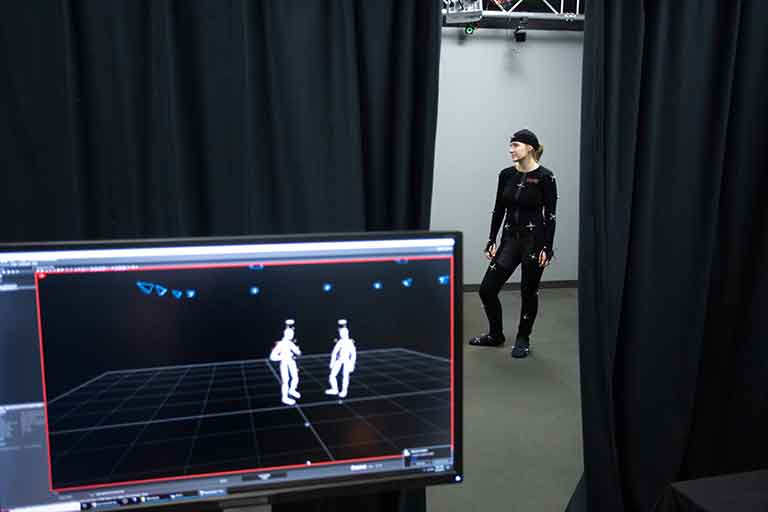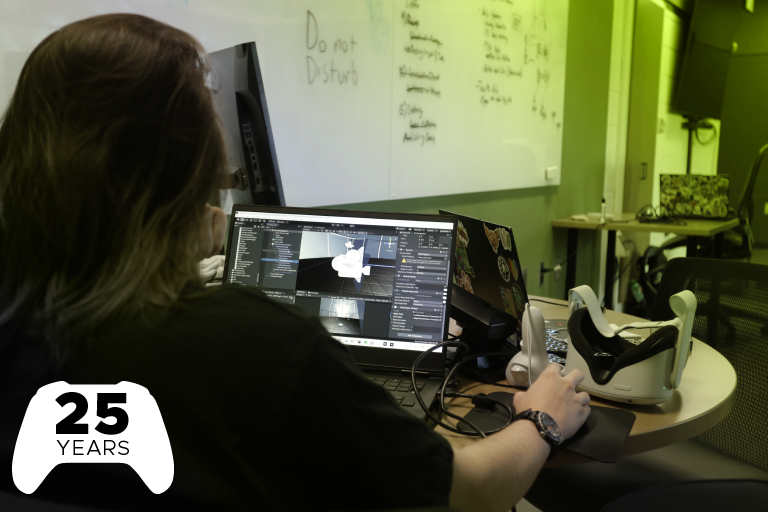The Games and Interactive Media major will provide a depth of knowledge, and a uniform core with foundational knowledge in several areas related to games and interactivity, including: knowledge of the art, design and programming fundamentals of digital game development, as well as the history, social impacts, and business of games. Students also gain valuable skills in communicating and collaborating in team-based projects while building a strong portfolio of games. We partner with game studios to provide an authentic, real-world experience in our coursework. Learning is project-based, resulting in a portfolio of small and large projects that reflects a broad variety of work.
Our students consistently produce high quality content and work for some of the largest and most respected game companies in the world (EA, Activision, Ubisoft, Rockstar, Blizzard, Bungie, Insomniac, and more). Our students and faculty created Plunder Panic, a team-based multiplayer game that received multiple awards, including the coveted People’s Choice Award at IndieCade 2018.
Visit games.msu.edu to see examples of student games!
Our program is also the home of the Games for Entertainment & Learning (GEL) Lab. The GEL's mission is to design innovative prototypes, techniques, and complete games for entertainment and learning and to advance state-of-the-art knowledge about social and individual effects of digital games.
View the MSU Games & Interactive Media BA Program Listing.
Technical Skills
Design
- Game Design
- Virtual / Augmented / Mixed Reality Design
Art/Visuals
- 3D Animation
- 3D Modeling
- 2D Illustration
- Technical Art
- Concept Design
- Environment Design
- Sound Design
- Game Interface Design
- Storytelling
Programming
- Foundations of Programming
- Game Programming
- Artificial Intelligence
- Data Mining
- Computer Graphics (shaders, rendering, etc.)
Project Management
- Time & Task Management
- Team Building
- Reporting
- Budgeting
Soft Skills
- Production
- Teamwork
- Communication
- Presenting
- Leadership
- Negotiation
- Self-directed learning
- Client relations
Careers
- Game Designer (Lead Designer, Level Designer, Scripter): Includes level design, scripting, and leadership roles in game development teams. Designers are responsible for the planning and execution of a game.
- UI/UX Designer: Focused on user experience, UI/UX designers are tasked with shaping the interaction the audience has with a game or interactive product.
- Technical Designer: A liaison between the programming and design team, concerned with implementation of mechanics and developing tools to aid in design.
- Programmer (Software Engineer, Lead Programmer): Programmers are responsible for the implementation of systems and mechanics in games and interactive media.
- 3D Artist (Modeler, Rigger, Animator): Several disciplines are involved in the 3d production pipeline. 3D artists range from generalists able produce finished creations on their own; to specialists in areas like animation, rigging, environment art, visual effect, etc.
- 2D Artist (Concept Artist, Illustrator): Much of the planning process of complex 3D games originates as 2D illustrations and sketches made to clarify the intended final product. Many games make use of 2 dimensional graphics for menus, UI, and in game assets.
- Technical Artist: Technical artists are the bridge between the programming team and the art team. Knowledgeable in both programming and the art pipeline they create tools for artists and fix technical problems with assets.
- Producer (Assistant Producer, Associate Producer, Lead Producer): Producers, while generally outside the technical aspects of game development are instrumental in creating a final product. Producers are focused on organization, deadlines, and team dynamics in an effort to make the development of an interactive media project as smooth as possible.
- Project Manager: Overseeing all aspects of a production, project managers are responsible for the vision of the game as well as the accurate execution of that vision.
- Quality Assurance: QA represents the testing of games to find bugs and errors in the programming. In QA testers will play games exhaustively while logging any bugs or errors they find along the way keeping the development team abreast of areas that need further refinement.
- Sound Designer: The auditory experience of a game is one of its most important aspects. Sound designers range from composers who create interactive scores, to sound effects designers who craft atmospheric soundscapes for their games.
- Game Scenario Writer: Game writers differ from other writers in the sense that they are often tasked with writing branching dialogue that could take a number of different directions based on the user’s choices. Game writers are responsible for keeping a clear narrative in a shifting game environment.
- Community Manager: Face of the company, managers PR, social media, and in game communities. Serves as the go between a game’s development team and its consumers.
- Web Design & Development: Web developers use a combination of design and programming tools to develop websites for a variety of clients. Careers range from user experience focused designers who create clear layouts for content to programming heavy developers who create complex websites’ backends.
- Mobile App Design & Development: One of the newest additions to the world of interactive media app development is a growing field. App developers create programs for mobile and other smart devices with a focus on functionality and usability.






